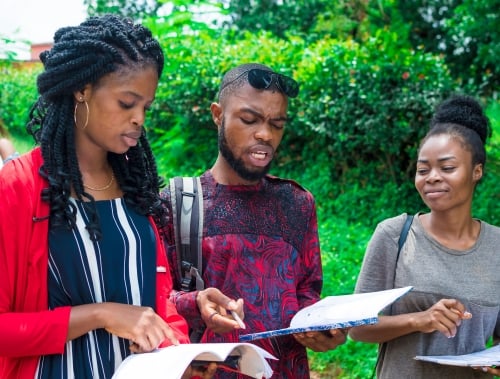Loving God With All Your Mind

I don’t know your childhood background, but mine was kind of typical for kids born in Brazil early in the 1980s. You know, that back and forth from home to school, learning to read and write, memorizing the multiplication table, leafing through some books and comics, attending classes and Sunday services, watching cartoons and movies, and so on. As a teenager, I became much more interested in soccer and music than anything else. I could easily spend half my week playing indoor and outdoor soccer games and rehearsing with my rock and roll band. A certain intellectual life was being developed through these cultural activities and educational experiences, but not that much.
Many years later, at the very beginning of my first week at the Bible College (São Paulo, Brazil), one of our teachers told us, “If you want to be a pastor, a missionary, or an educator, you ought to learn how to study, and you ought to work hard on that!” As a twenty-one-year-old, I thought, “Okay, I’m here to study, but I’m not really into this intellectual enterprise you’ve exhorted us to.” During the semester, this teacher continued sharing so many reasons why we should take advantage of our college years to learn how to study and do it consistently, nurturing a deep love for studies and intellectual growth. Again, a certain intellectual life was being developed through classes, readings, assignments, and papers, but not that much.
My turning point regarding developing a deep love for studies happened when I met Dr. Carlos Osvaldo at the beginning of my second bachelor's year. At that time, he was the Bible College’s rector. In addition to managing the institution and teaching several classes, he preached once a month at the campus chapel for the entire faculty and students. By listening to his teaching, observing his love for God, the Scriptures, and academic studies, and witnessing how he aligned his words with his actions in life and ministry, I realized I wanted to follow in his footsteps. Walking closely with Dr. Carlos fostered a certain intellectual life in me, and it seemed promising.
As soon as I dedicated my life to learning to integrate management, pastoring, and scholarship, I realized it wouldn’t be easy. I remember planning a very organized routine to achieve my goals (early alarms, physical exercises, devotionals, meals, classes, library, and hours of hard study) but messing it all up at the end of the first month of the semester. With so many books to read, theological reflections to prepare, and robust papers to present, I could only think, “Why did I choose to dive into these deep waters instead of keeping myself in shallow ones?” Or, “I love God with all my heart, soul, and strength, but I cannot love him with all my mind. It’s so hard!” Definitively, I was frustrated and unmotivated.
Then one day Dr. Carlos invited me to talk about my final paper proposal. He told me, “Ed, stop by my office this afternoon. Let’s discuss your research, chapters, bibliographies, and deadlines. More than that, let’s talk about anything else you want.” I must confess I didn’t hear the last phrase. I only listened to what he said about academic stuff to do, and it was the last thing I wanted to hear. He saw my panic, and after turning on Beethoven’s Symphony No. 6, he asked me, “Are you okay, son?” I answered with tear-filled eyes, “No, I am not. I simply cannot love God with all my mind. I did my best up to today, but I just can’t understand all these concepts or keep my pace. I don’t think I was born to do it. How do you handle it?”
“Son,” he said, “it is a marathon, not a 100m race. You’ll need a slow and steady rhythm. Moreover, you’ll need to develop it in an integrative and balanced way; otherwise, you might incur what Dr. Abraham Kuyper used to call ‘intellectualism, the dominance of the intellectual approach, the one-sided focus on the power that resides in the realm of concepts.’”[1] Dr.  Carlos kept saying, “Loving God with all your thoughts (head) in a healthy way will depend on integrating that with your loves (heart) and practices (hand).” I cannot explain how relieving it was to hear that advice. It seemed he had removed a thorn from my finger. Loving God with all my mind would be a long journey and task of developing Christian convictions holistically.
Carlos kept saying, “Loving God with all your thoughts (head) in a healthy way will depend on integrating that with your loves (heart) and practices (hand).” I cannot explain how relieving it was to hear that advice. It seemed he had removed a thorn from my finger. Loving God with all my mind would be a long journey and task of developing Christian convictions holistically.
Dr. Carlos Osvaldo not only mentored me in that final paper but also in my bachelor’s thesis. We became friends, and he had a fantastic impact on my life. Although he passed away in 2014, he left excellent books and recordings. More than that, he left his legacy. Through his teachings, I learned that, as a Christian, I have no option other than to love God as a prophet, a priest, and a king, to use Christ’s threefold office nomenclature.[2] Acting as a prophet, I imitate Christ by seeking the truth of God. Acting as a priest, I imitate Christ by devoting myself to God. Acting as a king, I imitate Christ by serving people according to God’s will. In other words, I ought to love God with all my mind and, simultaneously, my heart and hand, as Dr. Carlos taught.
Today, I’m a theology teacher, and it’s been incredible to use the same formative framework I received to help my students in their integral flourishing process. In my view, when Christian teachers view themselves
- as prophets within the academic setting, they embody the God-to-humanity relationship with their students by preparing themselves with wisdom, instructing truthfully, and evaluating through the lens of justice. A prophetic teacher also acts as a priest and king, demonstrating intellectual hospitality, and promoting a peaceful learning environment.
- as priests within the academic setting, they embody the humanity-to-God relationship with their students by devoting themselves to spiritual disciplines, modeling a journey of grace, and mentoring students mercifully. A priestly teacher also acts as a prophet and king, calling students to significant personal and public commitments.
- as kings within the academic setting, they embody headship over all their students by facilitating class interactions, stimulating collegial friendships, and encouraging students to find committed groups to belong to. A royal teacher also acts as a prophet and priest, boosting thoughtful table discussions and fostering a respectful acceptance of diverse opinions.
Since those Bible college days, I cannot imagine loving God with all my mind without considering my whole existence. Yes, I’ve been learning a lot about the Christian intellectual life. But how beautiful is it to realize we can love and help our students to “love the Lord your God with all your heart and with all your soul and with all your mind and with all your strength” (Mark 12:30, NIV).
For further reading:
- Kuyper, Abraham. Scholarship (Grand Rapids, MI: Christian’s Library Press, 2014).
- Mouw, Richard J. Called to the Life of the Mind: Some Advice for Evangelical Scholars (Chicago: William B. Eerdmans Publishing Company, 2014).
- Sire, James W. Habits of the Mind: Intellectual Life as a Christian Calling (Downers Grove, Ill.: InterVarsity Press, 2000).
Ednardo Duarte
Originally from Southern Brazil, Ednardo’s personal, academic, and ministerial journey has been deeply shaped by Christ’s threefold office of priest, prophet, and king. As an ordained Baptist pastor, he served the young adults and youth at his home congregation, the First Baptist Church of Porto Alegre. As a theology professor, he teaches Christian Ethics, Leadership, and Biblical Theology at Gramado Theological Seminary. Additionally, as a manager, he leads the TeachBeyond Global Transformational Education Centre for Latin America. His research interests include the Dutch Neo-Calvinist movement and its reception in Brazil, education and formation, and public theology.
[1] Kuyper, Abraham. Three Little Foxes. (All of Life Redeemed, Presteigne Wales, 2024), 8. Accessed October 27, 2024. www.allofliferedeemed.co.uk/Kuyper.
[2] Bavinck, Herman. Reformed Dogmatics: Volume 3: Sin and Salvation in Christ (Grand Rapids, MI: Baker Academic, 2006), 341-345, 366-367.



